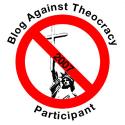 This time we'd like to bring up the In God We Trust on the money issue. I'm not superstitious and neither is Cat, so it's not like carrying around money with a religious message scares me. But I think there is something fundamentally wrong when the government makes a law that says everyone, regardless of there belief or lack of belief must carry and use currency that has a religious message on it. I will skip over the history of the phrase showing up on money...but it was officially made the national motto in 1956. There was a lot of fear of the atheistic Soviet Union at the time and it was felt that it would be a good idea to distinguish the U.S. from the godless commies.
This time we'd like to bring up the In God We Trust on the money issue. I'm not superstitious and neither is Cat, so it's not like carrying around money with a religious message scares me. But I think there is something fundamentally wrong when the government makes a law that says everyone, regardless of there belief or lack of belief must carry and use currency that has a religious message on it. I will skip over the history of the phrase showing up on money...but it was officially made the national motto in 1956. There was a lot of fear of the atheistic Soviet Union at the time and it was felt that it would be a good idea to distinguish the U.S. from the godless commies.Although it has been challenged in a lower court, the Supreme Court has refused to rule on the constitutionality of the motto or the phrase on currency. The phrase "ceremonial deism" has been used to describe references to God and religion by the government. Deism is a belief in a supreme being, but doesn't specify which...it's like generic religion. Recently we have seen more attempts to use the motto as a wedge to introduce the Christian concept of God as if it is recognized by government. In Indiana there are new license plates with the motto that are free while other specialty plates cost $20. There are Christian groups promoting the use of the motto in schools. There was a resolution in the U.S. House last year (it didn't pass, but it wouldn't have been law anyway) that said things like...
"Whereas the historical fact of the fundamental trust of the American people upon the God of the Bible is irrefutable;"
"Whereas Psalm 33:12 states, `Blessed is the nation whose God is the Lord.';"
"Resolved...That the Congress...encourages the American people to commemorate the national motto through personal acts of piety, patriotic and sacred assembly, prayer and petition on behalf of the Nation's elected and appointed leaders at the Federal, State, and local levels of government, and through a rededication of trust in God for the good and providential protection of this great Nation."
The Lemon Test is a standard that has been used by the Supreme Court to rule on First Amendment issues. It has 3 test or prongs. If any of these 3 prongs are violated, the government's action is deemed unconstitutional under the Establishment Clause of the First Amendment to the United States Constitution. The three prongs are...
- The government's action must have a legitimate secular purpose;
- The government's action must not have the primary effect of either advancing or inhibiting religion;
- The government's action must not result in an "excessive entanglement" with religion.
1. The government's action must have a legitimate secular purpose... The fact that the majority of Americans consider themselves religious no more justifies printing "In God We Trust" on money then suggesting that since the majority of Americans consider themselves Trekkies, Star Trek should be named the official sci-fi series of the nation.
2. The government's action must not have the primary effect of either advancing or inhibiting religion; ... There is no question in my mind that the presence of this message has the purpose of advancing religion, and that's not even dealing with the form of that religion. When you look at it closely it's clearly referring to a monotheistic male supreme being that we are expected to trust. This rules out a lot of religions, thereby inhibiting them.
3. The government's action must not result in an "excessive entanglement" with religion ... The fact that the government, by way of the dept. of the treasury, is directly involved in carrying out this law is entanglement. The government isn't simply allowing a violation of the First Amendment through inaction.
My question today is...can anyone think of a reasonable argument for why printing "In God We Trust" on currency doesn't violate one of the prongs of the Lemon Test? Pick one, any one.
This is part of the Blog Against Theocracy project.




4 comments:
Tonight I am working on a persuasive speech for my essay class and found your blog while researching my topic, which is that "In God We Trust" has no place on our money and should not be printed on it.
I think your assessment of how the motto fares against the Lemon Test is completely correct. I have also looked at the other Establishment tests, including the Coercion Test, the Endorsement Test, and the Neutrality Test, and it seems to violate all of them. I really don't see how the 9th and 4th Circuits could justifiably support a claim that these words have "no theological or ritualistic impact."
It's absolutely ridiculous to claim that a motto like "In God We Trust" has no theological impact!
Thanks again for your thought-provoking blog!
I hadn't thought to go through those other tests. Some of them are newer than the Lemon Test.
If you have a link to your essay, let us know. And the reaction it elicited would be interesting as well.
"In Allah We Trust"
"In Buddha We Trust"
One feels sure that the Talibangelicals promoting discounts on "In God We Trust" would not object to other license plates advertising other belief systems. Would they?
Yes, exactly.
How about "In George Bush We Don't Trust"?
Post a Comment